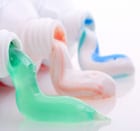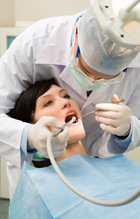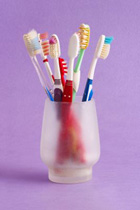 First impressions count in Leeds- whether you are swinging a deal or chatting someone up and as soon as you open your mouth, the first thing a person sees is your teeth If you are suffering from worn and tired looking teeth that are discoloured or chipped, it’s not a good first impression that you leave and in the long term, it can affect your overall self esteem. So if you have a few pounds to spare, you may like to seriously consider shelling out on a new smile by getting some veneers because not only are they versatile and strong wearing, they can put the glitz back in your mouth. Porcelain veneers are the favourite choice on offer right now. These wafer thin beauties are easy to make and fit- They can be colour toned to match the rest of your teeth and give off a very natural sheen in the mouth. Once you’ve decided to have the treatment, your dentist will remove the original enamel from your teeth and take an impression from which the veneers can made. Normally the imprints would be sent off to a lab to make the new fitting, unless you choose CEREC- which allows the new veneer to be made on site and fitted within the hour. Once you have got them back they are simply cemented into place. Lumineers are similar to veneers, a lot thinner and fitted in a similar way, except there is no removal of the tooth enamel. If you treat them with respect, they can last you up to 10 years, but it’s what they do for your smile makes them a very desirable option.
First impressions count in Leeds- whether you are swinging a deal or chatting someone up and as soon as you open your mouth, the first thing a person sees is your teeth If you are suffering from worn and tired looking teeth that are discoloured or chipped, it’s not a good first impression that you leave and in the long term, it can affect your overall self esteem. So if you have a few pounds to spare, you may like to seriously consider shelling out on a new smile by getting some veneers because not only are they versatile and strong wearing, they can put the glitz back in your mouth. Porcelain veneers are the favourite choice on offer right now. These wafer thin beauties are easy to make and fit- They can be colour toned to match the rest of your teeth and give off a very natural sheen in the mouth. Once you’ve decided to have the treatment, your dentist will remove the original enamel from your teeth and take an impression from which the veneers can made. Normally the imprints would be sent off to a lab to make the new fitting, unless you choose CEREC- which allows the new veneer to be made on site and fitted within the hour. Once you have got them back they are simply cemented into place. Lumineers are similar to veneers, a lot thinner and fitted in a similar way, except there is no removal of the tooth enamel. If you treat them with respect, they can last you up to 10 years, but it’s what they do for your smile makes them a very desirable option.





 It’s widely considered that everyone in central Leeds should have a bi-annual visit to the dentist because problems in your mouth can build up very quickly and cause further, more serious problems, if left untreated. When you visit your dentist, it’s very likely that you just want to get it over with and get the hell out of there, but really, it should be seen as an opportunity to discuss any problems that may have arisen since your last visit, you can even discuss subjects from oral hygiene and diet to cosmetic dentistry. This also gives the dentist a chance to clean your teeth from plaque or tartar build up, monitor all aspects concerning your teeth such as growth, gum disease, cavities and general wear and tear and administer any treatment you may require to keep your mouth healthy. However, if you start skipping visits, you are putting not only your mouth at risk, but the overall health of your body. Gum disease for example, can threaten your heart and digestive system as well as your teeth, and some treatments can be very expensive. Depending on just how far you’ve let yourself go, the price to rectify any damage done can stretch into thousands and the worst case scenario is losing your teeth altogether. Maintaining regular appointments can greatly reduce problems in the future and help keep your teeth and smile healthy.
It’s widely considered that everyone in central Leeds should have a bi-annual visit to the dentist because problems in your mouth can build up very quickly and cause further, more serious problems, if left untreated. When you visit your dentist, it’s very likely that you just want to get it over with and get the hell out of there, but really, it should be seen as an opportunity to discuss any problems that may have arisen since your last visit, you can even discuss subjects from oral hygiene and diet to cosmetic dentistry. This also gives the dentist a chance to clean your teeth from plaque or tartar build up, monitor all aspects concerning your teeth such as growth, gum disease, cavities and general wear and tear and administer any treatment you may require to keep your mouth healthy. However, if you start skipping visits, you are putting not only your mouth at risk, but the overall health of your body. Gum disease for example, can threaten your heart and digestive system as well as your teeth, and some treatments can be very expensive. Depending on just how far you’ve let yourself go, the price to rectify any damage done can stretch into thousands and the worst case scenario is losing your teeth altogether. Maintaining regular appointments can greatly reduce problems in the future and help keep your teeth and smile healthy. If you are one of these people in the city of Leeds that suffers from one phobia of a sort, you know that it is an incredible dilapidating problem- especially if the phobia is dental based. Phobias can be caused by many different things from personal experiences in your life to experiences to those around you, but at some point these phobias need to be addressed because they can stop you living a full and healthy life and can have a knock on affect leading to other traumas and phobias. If it is stopping you going to the dentist, you could go on to have a very unhealthy mouth, which will bring you other psychological problems further on in life. Dentists these days are very aware of these problems, as it makes it very difficult to administer the health care your mouth requires- some are especially trained in dealing with dental phobias. The first way to fight your phobia is to have a face to face meeting with your dentist, express your fears and build up a sense of trust between you. Understanding what your treatments involve and can give you a sense that you are controlling the treatment you require. Understanding sedation and relaxation techniques and the anaesthesias available to you, can make you more relaxed about your treatments and your visit to the dentist, pain-free.
If you are one of these people in the city of Leeds that suffers from one phobia of a sort, you know that it is an incredible dilapidating problem- especially if the phobia is dental based. Phobias can be caused by many different things from personal experiences in your life to experiences to those around you, but at some point these phobias need to be addressed because they can stop you living a full and healthy life and can have a knock on affect leading to other traumas and phobias. If it is stopping you going to the dentist, you could go on to have a very unhealthy mouth, which will bring you other psychological problems further on in life. Dentists these days are very aware of these problems, as it makes it very difficult to administer the health care your mouth requires- some are especially trained in dealing with dental phobias. The first way to fight your phobia is to have a face to face meeting with your dentist, express your fears and build up a sense of trust between you. Understanding what your treatments involve and can give you a sense that you are controlling the treatment you require. Understanding sedation and relaxation techniques and the anaesthesias available to you, can make you more relaxed about your treatments and your visit to the dentist, pain-free. Fluoride has been used for over 50 year in dental care- it is used in most common toothpastes all over the world, and you will even find it in your drinking water in Leeds- it is a great benefit to the teeth…or is it? Fluoride has proved itself in the fight against to decay- it helps to maintain a good level of saliva in the mouth that breaks down bacteria naturally and neutralises acids. It regenerates minerals in tooth enamel, making it harder and helps to reverse any decay that might be in its early stages- hence it can be found in most oral hygiene products, from mouthwashes to flosses. A dentist can also administer fluoride directly on the teeth for extra protection and to fight gum disease. However, some dentists are turning away from the use of fluoride because it is toxic and this is especially a concern in children- they tend to eat more paste than they brush with. This can not only lead to the teeth discolouring and dental fluorosis, but also a build up of fluoride the brain (and in some cases death). There are fluoride free toothpastes available on the market, aimed at kids, until they have kicked the habit of swallowing the stuff! Like most things, fluoride should be used in moderation. There is enough information out there to make your own informed decisions on the subject, but there is no doubt about the protection qualities that fluoride has for the teeth.
Fluoride has been used for over 50 year in dental care- it is used in most common toothpastes all over the world, and you will even find it in your drinking water in Leeds- it is a great benefit to the teeth…or is it? Fluoride has proved itself in the fight against to decay- it helps to maintain a good level of saliva in the mouth that breaks down bacteria naturally and neutralises acids. It regenerates minerals in tooth enamel, making it harder and helps to reverse any decay that might be in its early stages- hence it can be found in most oral hygiene products, from mouthwashes to flosses. A dentist can also administer fluoride directly on the teeth for extra protection and to fight gum disease. However, some dentists are turning away from the use of fluoride because it is toxic and this is especially a concern in children- they tend to eat more paste than they brush with. This can not only lead to the teeth discolouring and dental fluorosis, but also a build up of fluoride the brain (and in some cases death). There are fluoride free toothpastes available on the market, aimed at kids, until they have kicked the habit of swallowing the stuff! Like most things, fluoride should be used in moderation. There is enough information out there to make your own informed decisions on the subject, but there is no doubt about the protection qualities that fluoride has for the teeth. Dental decay in central Leeds will affect most of us at some point in our lives, from childhood through to old age and if the teeth get really bad, chances are it’s going to cost a lot of money to put right- all dental work comes at a price from veneers to implants, so in the case of bad teeth, prevention is much more preferable to cure. In all cases in the mouth, problems start to arise because of poor oral hygiene and poor dietary habits. Sugars, starches smoking and excessive drinking can lead to a breakdown of saliva in the mouth and allow bacteria to develop into plaque- this in turn leads to gum disease from which cavities can form. All good hygiene starts at home, from what toothbrush and paste you choose, to mouthwashes and flosses. A regular hygiene program is a good start to fending off bad teeth. But don’t get complacent by thinking this eliminates the need to see your dentist regularly. Dentists can see things you have overlooked; a simple x-ray can identify decay and caries early on. They will remove any build up of plaque or tartar and repair the teeth. It’s also the best opportunity to get advice on your own hygiene programs. Bad teeth are also ugly, and that in itself can lead to all manner of issues arising.
Dental decay in central Leeds will affect most of us at some point in our lives, from childhood through to old age and if the teeth get really bad, chances are it’s going to cost a lot of money to put right- all dental work comes at a price from veneers to implants, so in the case of bad teeth, prevention is much more preferable to cure. In all cases in the mouth, problems start to arise because of poor oral hygiene and poor dietary habits. Sugars, starches smoking and excessive drinking can lead to a breakdown of saliva in the mouth and allow bacteria to develop into plaque- this in turn leads to gum disease from which cavities can form. All good hygiene starts at home, from what toothbrush and paste you choose, to mouthwashes and flosses. A regular hygiene program is a good start to fending off bad teeth. But don’t get complacent by thinking this eliminates the need to see your dentist regularly. Dentists can see things you have overlooked; a simple x-ray can identify decay and caries early on. They will remove any build up of plaque or tartar and repair the teeth. It’s also the best opportunity to get advice on your own hygiene programs. Bad teeth are also ugly, and that in itself can lead to all manner of issues arising. If you are one of these people in the city of Leeds that live alone and suffer from stress or anger problems, there’s a very good chance you may grind your teeth (more commonly known as Bruxism), and you may also be completely unaware of the problem. But it’s not a problem to be ignored as it can lead to many problems throughout the upper body. The obvious symptoms of teeth grinding are aching jaws, headaches, neck pain and stress in the shoulders; if these symptoms prevail, you should consult your dentist. They may recommend tooth guards, splints or even dental overlays to avoid damage to the teeth, but the jaw will still undergo strain from the desire to grind. Bruxism is directly linked to stress and a hectic lifestyle. But once the problem is identified, it can be addressed. Stress management can reduce the level of teeth grinding through identifying the causes of stress and learning how to unwind after a heavy day. There are many relaxing techniques that can be used to help the body to de-stress before sleeping. If you go to sleep once you have unwound and calmed the body down, there chances of teeth grinding are greatly reduced.
If you are one of these people in the city of Leeds that live alone and suffer from stress or anger problems, there’s a very good chance you may grind your teeth (more commonly known as Bruxism), and you may also be completely unaware of the problem. But it’s not a problem to be ignored as it can lead to many problems throughout the upper body. The obvious symptoms of teeth grinding are aching jaws, headaches, neck pain and stress in the shoulders; if these symptoms prevail, you should consult your dentist. They may recommend tooth guards, splints or even dental overlays to avoid damage to the teeth, but the jaw will still undergo strain from the desire to grind. Bruxism is directly linked to stress and a hectic lifestyle. But once the problem is identified, it can be addressed. Stress management can reduce the level of teeth grinding through identifying the causes of stress and learning how to unwind after a heavy day. There are many relaxing techniques that can be used to help the body to de-stress before sleeping. If you go to sleep once you have unwound and calmed the body down, there chances of teeth grinding are greatly reduced. In Leeds, it’s important to set a precedent of oral hygiene early on in a child’s life, to fend off potential dental problems in the future. As a child’s teeth develop from an early age, loss and growth can lead to a child suffering from orthodontal
In Leeds, it’s important to set a precedent of oral hygiene early on in a child’s life, to fend off potential dental problems in the future. As a child’s teeth develop from an early age, loss and growth can lead to a child suffering from orthodontal If you’ve just had an extraction in central Leeds of late, it’s very important that you take care of the wound afterwards, for many reasons, one of them being the development of a dry socket that can lead to further complications. Once a tooth is removed, a blood clot would normally form to aid the healing process, but if this does not happen, the surrounding bone and wound are vulnerable to infection and bacteria that can lead to the socket becoming dry. A normal extraction can take around 5 days to heal, longer in the case of teeth at the back of the mouth, but if dryness sets in, the pain can intensify around the removal site and expose the rest of the mouth to infection and gum disease, and also lead to problems in the ears and eyes. Hygiene is important in combating this problem. If the problem starts, it’s important to revisit the dentist for medication, and this may also require subsequent visits to combat the problem. Essentially, the wound should be kept clear- certain stodgy foods such as potatoes and nuts should be avoided during healing as they can lead to a build up of bacterial particles in the mouth. The use of a good mouthwash should be used after eating to remove any food left in the mouth and if the problem prevails, a dentist can prescribe drugs and recommend the use of herbal remedies such as clove and Echinacea oil.
If you’ve just had an extraction in central Leeds of late, it’s very important that you take care of the wound afterwards, for many reasons, one of them being the development of a dry socket that can lead to further complications. Once a tooth is removed, a blood clot would normally form to aid the healing process, but if this does not happen, the surrounding bone and wound are vulnerable to infection and bacteria that can lead to the socket becoming dry. A normal extraction can take around 5 days to heal, longer in the case of teeth at the back of the mouth, but if dryness sets in, the pain can intensify around the removal site and expose the rest of the mouth to infection and gum disease, and also lead to problems in the ears and eyes. Hygiene is important in combating this problem. If the problem starts, it’s important to revisit the dentist for medication, and this may also require subsequent visits to combat the problem. Essentially, the wound should be kept clear- certain stodgy foods such as potatoes and nuts should be avoided during healing as they can lead to a build up of bacterial particles in the mouth. The use of a good mouthwash should be used after eating to remove any food left in the mouth and if the problem prevails, a dentist can prescribe drugs and recommend the use of herbal remedies such as clove and Echinacea oil. It is important that tooth brushing, which ought to be protecting your teeth is not damaging them. This can happen if you are brushing too vigorously and you might want to choose a brush with softer bristles so that brushing doesn’t make your gums bleed and compromise your enamel.
It is important that tooth brushing, which ought to be protecting your teeth is not damaging them. This can happen if you are brushing too vigorously and you might want to choose a brush with softer bristles so that brushing doesn’t make your gums bleed and compromise your enamel. The fight against plaque must be taken seriously in order to avoid the erosion of teeth. You should brush your teeth and floss at least twice a day in order to remove plaque from your teeth. If left unchecked, plaque can attack the enamel and compromise teeth, causing them to erode.
The fight against plaque must be taken seriously in order to avoid the erosion of teeth. You should brush your teeth and floss at least twice a day in order to remove plaque from your teeth. If left unchecked, plaque can attack the enamel and compromise teeth, causing them to erode.

